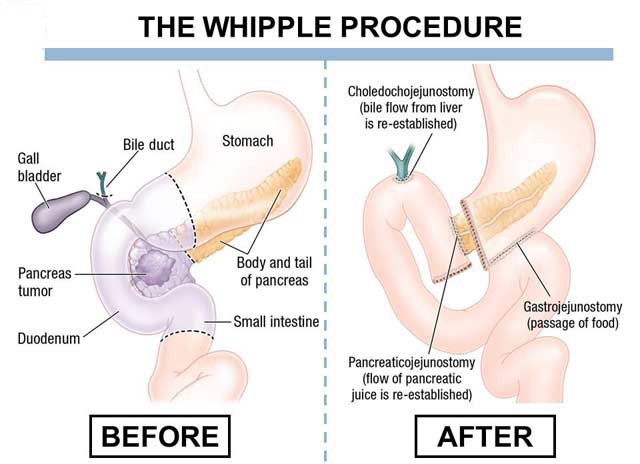Pancreatic cancer develops quickly and relatively unnoticeable. That’s why only 17% of people detect the disease at the operative stage. Doctors-Coordinators of MediGlobus explain about the operations for pancreas cancer, where to find a good surgeon, what to do before and after surgery.
READ IN THE ARTICLE:
Surgical treatment of pancreatic cancer
Where to treat pancreatic cancer
Diagnostics before surgery for pancreatic cancer
Methods of surgical treatment for pancreatic cancer
How to maintain health after pancreatic cancer surgery
Treatment of pancreatic cancer without surgery
SURGICAL TREATMENT OF PANCREAS CANCER

Operative treatment of pancreas cancer is possible if the pancreatic tumor is within the gland, there is no metastases and vital arteries/veins are not affected.
The essence of surgery for pancreatic cancer is the partial or total removal of the organ. This depends on the size of the lesion, as well as its location.
Surgical intervention is carried out by a multidisciplinary team consisting of a surgeon, oncologist, anesthesiologist and if necessary a radiotherapy specialist.
Due to this, all aspects of the procedure are under full control. In addition to the operation itself, patient also needs chemo for pancreatic cancer and radiotherapy.
Supporting therapy (chemo/radio) is prescribed before surgery to reduce the tumor and to ensure the possibility of surgical intervention in pancreas cancer for particular patient.
This supportive therapy is also needed AFTER surgical intervention to reduce the risk of disease recurrence.
The combination therapies increased the percentage of pancreatic cancer survival rate(five-year survival) from 25% (with exceptional surgical treatment) to more than 60% in the І stage and 50% in the ІІ stage (combined).
WHERE TO TREAT PANCREATIC CANCER?
The highest success rates in the treatment of operable pancreatic cancer are demonstrated in the clinics of Israel and Germany. Top specialists in visceral surgery (operative treatment of the digestive system) work in the German clinics of Helios and Nordwest. We are talking about the Professors Thomas Krauss and Mathias Birt. They are specialists with many years of experience in modern methods of surgery on pancreas cancer. In the Israeli clinic Ichilov, the country’s leading surgeon, Professor Joseph Klausner is working. An outstanding specialist who is also a member of the American College of Surgeons and has a unique knowledge about the latest advances in the surgical and non-surgical treatment of pancreatic tumors.
DIAGNOSIS BEFORE PANCREATIC CANCER SURGERY
The location of the pancreas makes it difficult to conduct an examination. That is why the diagnostic procedures are started only if the patient has specific complaints.
The diagnostic complex for pancreatic cancer consist of following procedures:
- General blood analysis;
- Biochemical blood tests – determines the amount of pancreatic enzymes in the patient’s blood (lipase, amylase, etc.), bilirubin, bile acids, hepatic transaminases;
- The analysis for CEA and CA 19-9 tumor markers serves for the detection of cancer embryonic antigen and CA 19-9. It is an additional diagnostic method and is assigned in combination with other assays. It is also necessary for obtaining information on the results of therapy during the process of treatment;
- hENT1 analysis – genetic analysis for sensitivity to chemotherapy Gemcitabine;
- CT scan with contrast – provides accurate information about the localization and nature of the tumor. With the help of CT scan with contrast you can get information even about small tumors in the pancreas;
- Endoscopic ultrasound of the pancreas – provides information on changes in the pancreas. Recognizes, including small tumors. In the process of endoscopic ultrasound, it is possible to obtain a tissue sample for histological examination;
- Ultrasound – a less informative diagnostic method, suitable for large tumors;
- ERCP – endoscopic retrograde cholangiopancreatography, provides information on the state of the gallbladder and bile ducts;
- Biopsy – is performed to confirm / disprove the diagnosis by histological analysis of tumor tissue. A biopsy is performed on a small tumor. If the neoplasm is large – most often resection is immediately performed;
- PET-CT – is prescribed to clarify the stage of pancreatic cancer.
METHODS OF SURGICAL TREATMENT OF PANCREAS CANCER
Whipple procedure

Removal of the pancreas by the Whipple method is performed when the tumor is localized in the region of the head of the organ. Head of the pancreas cancer occurs in about 60% of cases. Whipple surgery involves surgical removal of not only the head itself, but also 2/3 of the stomach, the site of the small intestine, as well as the gallbladder, ducts and the nearby lymph nodes.
Surgical intervention in pancreatic cancer is possible with open surgery as well as laparoscopy. Whipple technique is quite difficult to perform and requires simultaneous reconstruction after surgery on the pancreas. The period of full recovery is several months.
Pylorus preserving pancreatico duodenal resection by Traverso (kind of Whipple operation). This method of surgical intervention on pancreas can also be performed if the tumor is located in the head of the organ.
The operation involves the preservation of the stomach, including the portion located after the pyloric. Operation Traverso excludes such complications as vitamin B12 deficiency, small intestine dysbiosis and other consequences of resection of a part of the stomach.
However, removal of the duodenum still significantly reduces the patient’s quality of life.
Distal pancreatectomy
It is prescribed to patients with localization of a pancreatic tumor in the tail. The operation consist of left-sided resection of the tail and body of the organ. If the tumor spreads to the spleen vessels, it is removed as well. If other nearby organs are affected, the surgeon also makes a decision to perform their resection.
Total pancreatectomy
The most radical pancreatic cancer operation, which involves the removal of the entire body. It is extremely rare. After this type of surgical treatment of pancreatic cancer, absorptive and digestive functions are disrupted and diabetes also develops. Patients after total pancreatectomy will subsequently need pancreatic enzyme-containing drugs as well as insulin.
HOW TO MAINTAIN HEALTH AFTER THE OPERATION OF PANCREATIC CANCER?
After surgical treatment of pancreatic cancer, you must additionally take digestive enzymes. The dosage of the drugs is determined by the doctor in charge. If a resection of the spleen has been performed, then the patient needs to monitor the level of platelets in the blood. In addition, after the operation of pancreatic cancer, you need to constantly check the blood sugar level because there is a risk of developing diabetes.
Regarding regular examinations after pancreas surgery – it is better to undergo examination with a specialist, do ultrasound and give analysis for CEA and CA 19-9 oncomarkers every 3 months.
TREATMENT OF PANCREATIC CANCER WITHOUT OPERATION
Patients with inoperable pancreatic cancer can also go through some interventions. Today, Nano Knife for pancreatic cancer is available in the best clinics of the world. This device is capable of completely destroying the tumor with the help of an electric current of high voltage without harming healthy tissues. Only few doctors globally are certified specialists in the treatment of pancreatic cancer with Nano-Knife. These are Israeli doctors Marat Hayikin and Yuri Goldis (Sheba), Riad Hadad (Assuta), as well as German surgeon Mathias Birt (Helios) and Swiss specialist Hani Oveira (Hirslanden).
For more information about surgery for pancreatic cancer, contact your MediGlobus Doctor-coordinator.



